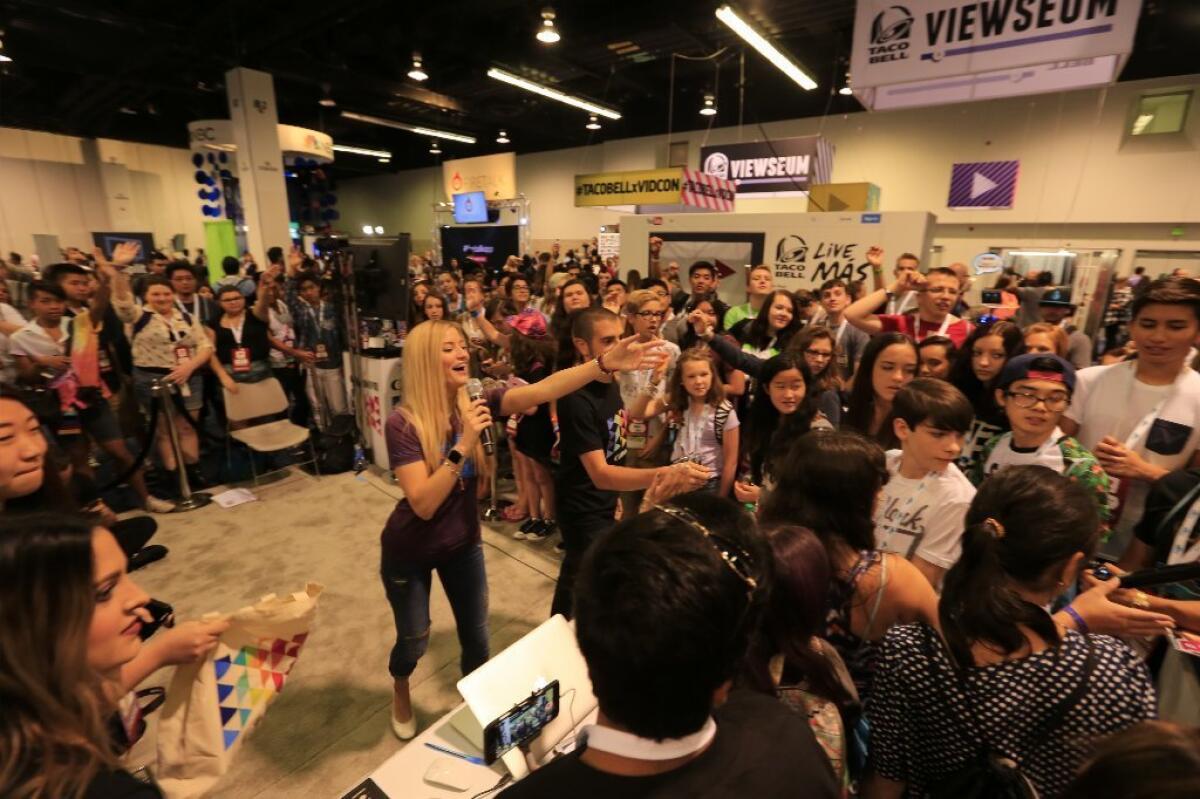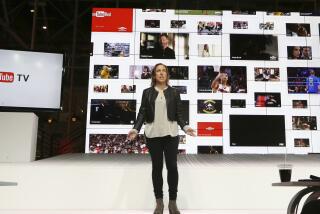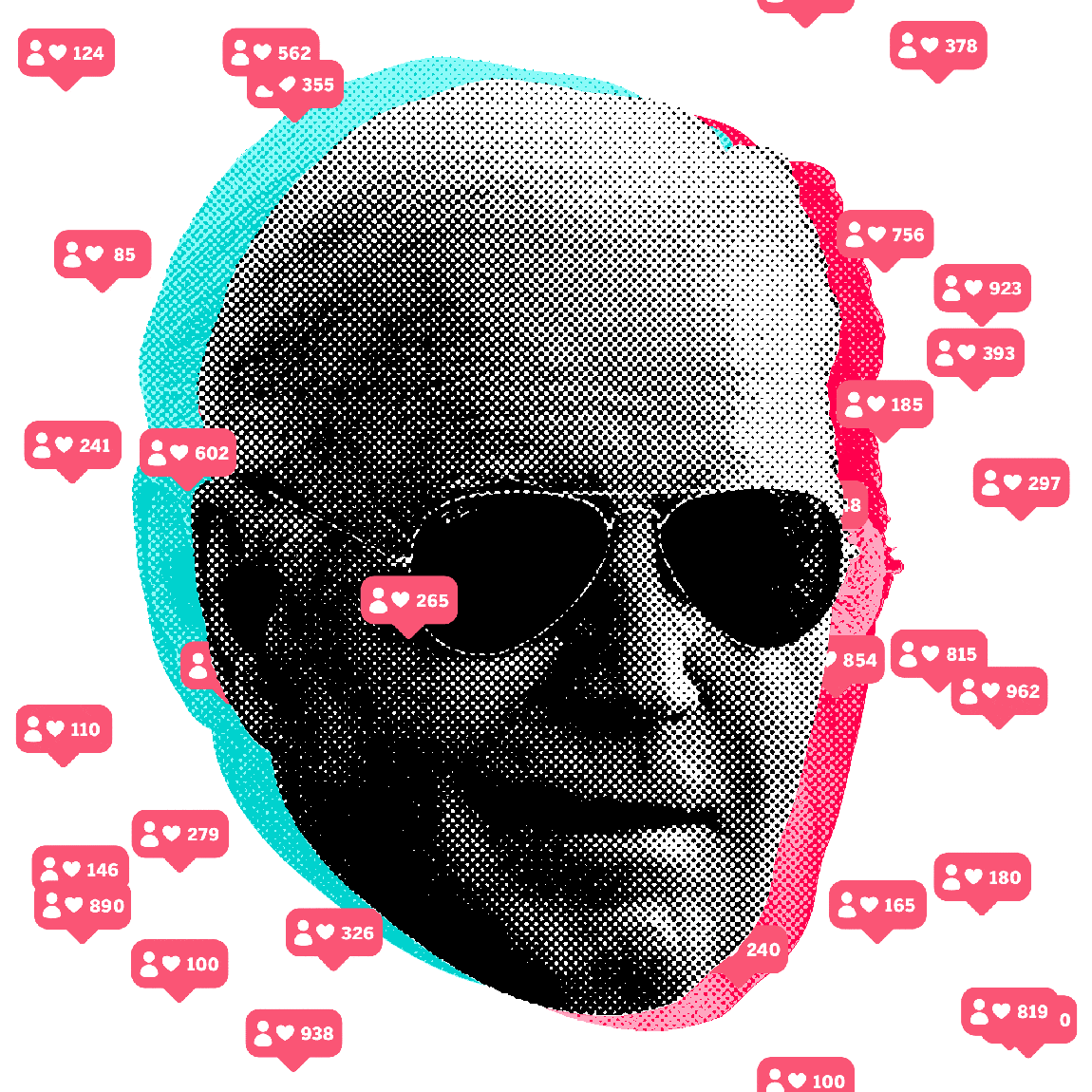Facebook a bigger player at this year’s VidCon

- Share via
Skyy John owes much of his early Internet fame to YouTube, where he’s amassed nearly 3 million subscribers to his cocktail tutorial channel, Tipsy Bartender.
But more recently, John has switched-up the recipe, posting clips for his strawberry margarita Jello shots or his mini vodka watermelon bowl on Facebook. The result? Millions more views and more people stopping him in public.
“That’s what turned me on to Facebook -- when people would recognize me at the supermarket,” the 36-year-old former Barney’s Beanery bartender said.
------------
For the record
9:21 a.m., June 13: A previous version of this article erroneously stated that Facebook would have a booth at E3. It will have a meeting room.
------------
John credits the change to the ease with which users can share his videos on Facebook, increasing the chances his outlandish drinks go viral.
He’s the type of closely followed video creator Facebook is now trying to appeal to at this year’s confab of digital stars, fans and advertisers known as VidCon.
In the last year, the Menlo Park, Calif., company has doubled its daily video views to 8 billion and rolled out Facebook Live, a livestreaming service that’s quickly building momentum, having already attracted celebrities and big-name publishers.
At VidCon, a three-day event in Anaheim that starts June 23, Facebook will get to hear first-hand from the top YouTubers, Viners and Snapchaters, among others about what they want from a video platform.
“The goal and plan is to spend time there listening and talking with creators and the creative community, who are there in massive numbers,” said Sibyl Goldman, Facebook’s head of entertainment partnerships. “We want to get as much feedback as we can to inform what we do.”
It’s a beachhead at an event that has long been synonymous with its title sponsor, YouTube. And while Facebook has attended several VidCons in the past, this is the first year that the social network has risen to the forefront of any conversation about the future of digital video.
“By virtue of its scale, anything Facebook does is potentially transformative,” said Paul Verna, a senior analyst at digital media research firm EMarketer. “They’re extremely determined to become a major player in video and they’re not a company that shies away from its goals. They’re a force to be reckoned with.”
See more of our top stories on Facebook »
It’s not just VidCon where Facebook is planting its flag. The company will also attend E3, the video game industry event that will draw tens of thousands of people to the Los Angeles Convention Center this week.
A booth inside E3 and an exhibit across the street at the L.A. Live plaza show that Facebook isn’t conceding to Twitch, an Amazon-owned company and increasingly a verb synonymous with sharing videos about video games.
Since hiring new executives last fall to work with the video game industry, Facebook has introduced tools for video game players to easily post about what they’re playing -- and export video of in-game action onto Facebook Live, the company’s new streaming service.
Cheaper mobile data and beefier smartphones have led to an explosion in digital video consumption in recent years. Advertisers are expected to spend $9.8 billion on digital video this year, nearly doubling the amount they spent just two years ago, according to EMarketer.
To seize on the opportunity, Facebook has bolstered its server farms to handle the surge in video data. It’s paying celebrities and publishers to use Facebook Live, and it’s tweaked its algorithms to favor video on users’ news feeds.
Gavin McGarry, cofounder of social media agency Jumpwire Media, said a Facebook post with text of about eight words will show up on only 12% of followers’ news feeds. However, that rate shoots up to 45% if the post includes a video and 50% if it’s for Facebook Live, according to his company’s test (the results were only for Facebook pages often used by businesses, not personal profiles).
“Last year, people weren’t talking about Facebook video a lot.” said McGarry, who’s leading a workshop at VidCon where attendees can learn how to use Facebook’s algorithm to their benefit. “It’s so funny how in one year so much can change … If you don’t have a Facebook strategy, then you don’t have a video strategy.”
It’s so funny how in one year so much can change … If you don’t have a Facebook strategy, then you don’t have a video strategy.
— Gavin McGarry, cofounder of social media agency Jumpwire Media
That reliance on algorithms to surface videos is something of a demarcation point for Facebook and YouTube -- and one of the chief reasons why many believe the two platforms are different enough as to not tear each other apart, at least anytime soon.
YouTube largely relies on its search engine to connect users to videos. It’s much more of a repository of clips, shows and movies than a driver of the viral video du jour. Facebook relies on users sharing videos for distribution -- meaning clips can generate explosive viewership one day and then disappear the next.
YouTube has one distinct advantage at the moment: It shares the advertising revenue its creators generate online. Facebook is still experimenting with monetization, partnering with a handful of publishers to share ad revenue and allowing some verified users to post sponsored videos.
“YouTube, unlike any other social media platform, started sharing revenue very early on,” said Hank Green, who founded VidCon in 2010 with his brother John Green, an author and fellow vlogger. “They started sending me checks, which meant I could [make videos] full time and spend money on it and invest in it. That’s been huge for the industry of content creation.”
SIGN UP for the free California Inc. business newsletter »
Green was also at the forefront of a controversy last year over freebooting, which is when people rip videos off YouTube and upload them onto Facebook. That cost YouTubers millions of views, the metric that determines ad revenue.
Green accused Facebook of cheating, lying and stealing in a post on Medium last August, which did nothing to engender goodwill within the YouTube creator community toward Facebook. The social network led by Mark Zuckerberg countered by introducing a service called Rights Manager in April to identify and stem copyright violators.
“The problem is being managed, but there’s still a ways to go,” Green said.
(To be fair, YouTube was also lambasted in its early days for copyright infringement before it was sold to Google, which introduced Content ID, a program designed to catch violators).
Asked to comment on the potential threat Facebook poses, YouTube instead directed The Times to statistics showing that the amount of time users spend watching YouTube videos has increased at least 50% year-over-year for three years in a row. (YouTube doesn’t disclose daily video views, making an apples-to-apples comparison with Facebook difficult.)
YouTube also said the growth of other video platforms has driven more viewers to its site and app by virtue of expanding the global audience for online video. That’s resulted in more advertising revenue.
Susan Wojcicki, YouTube’s chief executive, will outline some of the company’s latest innovations and original programming in a keynote address at VidCon.
Facebook’s head of product, Fidji Simo, will take the same stage on the same day to discuss the company’s video strategy. Facebook is also sending one of its lead liaisons to the creator community, Lauren Schnipper, to the event and will host a Facebook Live lounge at the nearby Hilton Anaheim.
As entrenched as YouTube may be, it was unfathomable only a few years ago to think there would be Facebookers the way there are YouTubers.
But now there are creators like Gabriel Conte, who, after building a following of 1.9 million on Vine, has begun devoting more of his energy to Facebook. The Florida native now living in Burbank makes videos with titles like “When Your Crush Touches You!” and is prone to flashing his six-pack abs. About 70% of his audience is female, mostly age 18 to 25.
At 21, Conte may seem an odd fit for a social network that’s often derided as too old now that everyone’s mom and dad is on it. Questions persist about whether Facebook can attract enough young viewers to compete with the likes of Snapchat and its 10 million daily video views.
That hasn’t hurt Conte. He says the teenage fans who supported him on Vine when he was in high school are following him to Facebook as they age too. He’s also getting a little bump from an even older demographic.
“My parents’ friends tell me they watch my videos and share it on Facebook,” Conte said. “Even my grandparents are checking out my videos.”
ALSO
Microsoft to buy networking site LinkedIn for $26.2 billion
Walgreens severs ties with blood-testing startup Theranos
Apple’s Siri has appmakers excited, but it could end up frustrating them
Twitter: @dhpierson
Times staff writer Paresh Dave contributed to this report.







